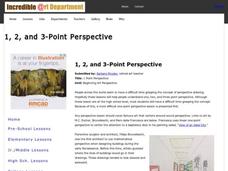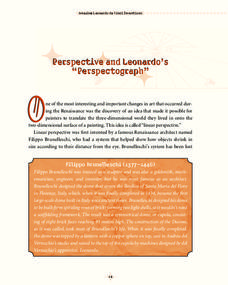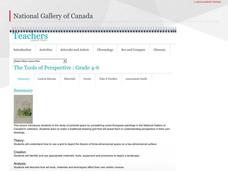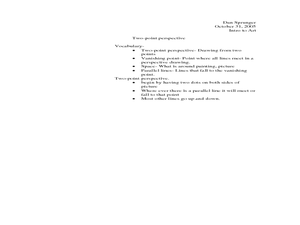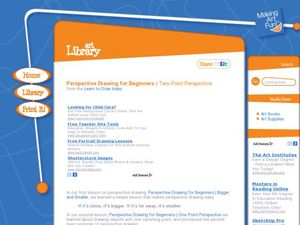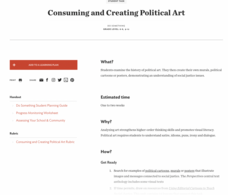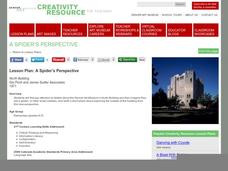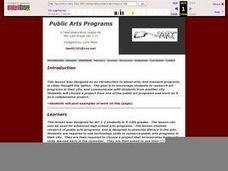Incredible Art
1, 2, and 3-Point Perspective
Introduce drawing students to perspective with a series of lesson plan that detail how to draft images in one-, two-, and three-point perspective. Each exercise includes step-by-step, illustrated directions and examples.
The New York Times
Perspective and Leonardo’s “Perspectograph”
Filippo Brunelleschi's invention of linear perspective during the Renaissance was further developed by his apprentice, a young artist named Leonardo da Vinci. Now modern artists can give da Vinci's famous perspectograph a try...
National Gallery of Canada
Mastering One-Point Perspective
Cover one-point perspective through observation and practice. Class members examine several works of art that use one-point perspective, look at magazine images to find the vanishing points and horizon lines, and draw their own city...
Curated OER
Lesson: Possible Perspectives
Visual art is the inspiration for a creative writing activity focused on having learners write from different perspectives. They analyze the image Yellow Rain Jacket, picking out details to help their storytelling. They use the details...
National Gallery of Canada
The Tools of Perspective
Make a study of perspective in the real world. Learners examine and discuss works of art that show examples of perspective before trying their own hands at it. Using a grid drawn on transparent paper, class members transfer a view from a...
Curated OER
Intro to Art
Students explore illusions by drawing and viewing images in class. In this art perspective lesson, students analyze a skeleton outline drawing which demonstrates the ability to draw in a two point perspective. Students utilize the...
Curated OER
Perspective Drawing for Beginners-Two Point Perspective
Students inspect two point perspective. In this perspective lesson, students explore drawing with two vanishing points. Students create an original piece of art using two point perspective.
Curated OER
Perspective Drawing for Beginners
Students explore perspective while drawing. In this perspective lesson, students discover that faraway objects should be drawn smaller than objects that are closer. Students experiment with perspective as they draw pictures of trees on a...
Curated OER
Light at Night
Portraying accurate light in a chalk drawing can be difficult. This useful PowerPoint provides fantastic guidelines to achieve good lighting perspective in a drawing. Three photo examples are provides on slides six, eight, and ten, to...
Curated OER
Art Basics Scavenger Hunt
Hand out this worksheet and lead your class on a scavenger hunt. Pupils look for examples of shape, form, balance, pattern, perspective, space, and depth. They draw and write about the examples they've found. A great resource to add...
Teaching Tolerance
Consuming and Creating Political Art
A picture is worth a thousand words, but political art may be worth even more! After examining examples of political cartoons, murals, and other forms of public art, class members create their own pieces to reflect their ideals and...
Curated OER
Shaded Bottles
Learners draw, and then paint three-dimensional bottles to practice shading which shows shape and perspective. The step-by-step process for creating dimensional still life art is outlined, which makes teaching art an attainable task. Oil...
Curated OER
Perspective Drawing for Beginners
Students explore one point perspective. In this perspective lesson, students discover how to create illustrations with vanishing points. Students create an original piece of art.
Norfork School District
Habits of Mind
Why do artists create? To solve a problem, of course. Young artists work individually and then in groups to create observational, imaginative, and narrative drawings in response to an assignment that requires them to employ all 16...
Curated OER
Lesson: A Spider's Perspective
A fun way to grow a class of creative thinkers, is to add creative projects to your weekly line up. Kids pretend they are small insects or spiders crawling up the side of a huge building. They use vivid imagery, rich detail, and their...
Curated OER
Public Arts Programs
High schoolers choose a project from one of the public art programs and work on it as a collaborative project. The goal is to encourage students to research art programs in their city, and communicate with high schoolers from another city.
Curated OER
Compare and Contrast Photograph Art
Take a trip down Pearblossom Highway with this lesson plan about comparing and contrasting. Using David Hockney's Pearblossom Hwy and another image of the same highway (photograph or other image), students compare and contrast the two...
National Gallery of Canada
Taken Out of Perspective
Art does not always have to look perfectly realistic. Play with proportion and shape by stretching images. Pupils study works of art by Picasso, Cézanne, and Monet before selecting a photograph to adapt. They use a distorted grid to...
Project Articulate
Textured Landscapes with Grant Wood
Explore the world of textured landscapes through the eyes of the famous artist, Grant Wood. Here is an elementary art lesson in which scholars learn about Grant Wood's life, view his work, draw their own textured landscape, and then...
Curated OER
Shoes and the Backyard Landscape
Your shoes get a lot of mileage in familiar places. Represent the places you have traveled the most with an art project based on a print of Indian People Wear Shoes and Socks by Juane Quick-to-See Smith. Kids trace their shoes and...
Curated OER
Near and Far Snow People
Students study perspective drawing. They create depth on a flat surface by using size and placement and define horizontal line. They investigate the basic techniques of using watercolors.
Curated OER
Keeping Architecture In Perspective
Students create a box, the letter L, a triangle, and a circle in perspective in this lesson introducing the art and career of an Architect. The lesson ephasizes practice in perspective and encourages the use of a local architect as a...
Curated OER
Fine Art to Animation With Keith Haring
Students examine artwork and Flip Books by Keith Haring. They analyze elements of line and color through drawing and create their own morphes using a computer animation marker.
University of Minnesota
Beautiful Brain: Brain Inspiration
"Neuroscientists consider Cajal as important to their discipline as Einstein is to physics." The first of four lessons has scholars view Santiago Ramon y Cajal's drawings of neurons. They reflect and respond to the art through writing...


